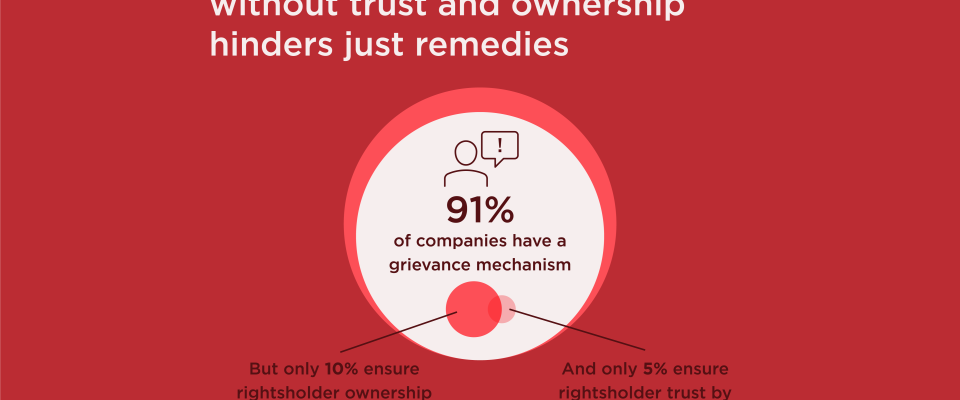Key finding
Access to grievance mechanisms without trust and ownership hinders just remedies

Over the last five years, companies have been working on providing ways for workers and other people who might be affected by their actions to voice their concerns through grievance mechanisms. In 2023, 91% of companies provide a grievance mechanism for all their workers and 76% for external stakeholders, compared to 83% and 46% in 2017, respectively. These mechanisms provide a way for rightsholders to raise issues and enable companies to spot key concerns, complementing their human rights due diligence process. However, one of the most important aspects of these mechanisms is allowing people to seek remedies when the company has caused them harm. Whether this works depends on how well the mechanism is set up. To make sure the process is fair and that companies are held accountable, it’s vital that the people who have been harmed are involved along the way as their case is handled. Rightsholders’ ability and willingness to use and engage with grievance mechanisms hinges on their sense of trust and ownership. While it is encouraging to see improved access for rightsholders to company grievance mechanisms, companies fall short in demonstrating how they ensure rightsholders are meaningfully involved in remediation. Only 5% of companies disclose evidence of ensuring rightsholder trust and 10% disclose evidence of ensuring rightsholder ownership.
Our assessment finds that only 5% of companies make sure that rightsholders trust the grievance mechanism. Trust is built by making things clear and predictable: explaining the procedures for handling complaints, the timeframes, and what can be expected as an outcome. When companies provide this information, it empowers rightsholders and reduces the information gap between them and the company. On the flip side, when things are unclear, it can lead to distrust, powerlessness and discourage people from voicing their concern or engaging with the company. Our assessment also finds that only 10% of companies ensure rightsholders feel a sense of ownership in the grievance mechanism by involving them in its design, performance and improvement. Getting input from actual and potential users helps the company understand their experiences and remove any barriers to access and engagement, especially for vulnerable groups.
In light of emerging HRDD regulation, grievance mechanisms focused on rightsholders will best serve businesses’ need to build resilience and provide robust means of identifying, managing and mitigating risks to people. The centrality of rightsholders as required by the UNGPs is best served by their active engagement with and ownership of grievance mechanisms. The question is no longer can we afford to involve rightsholders, but rather can we afford not to.
– Archana Kotecha, CEO and Founder of the Remedy Project
The fact that many companies don’t disclose their efforts to ensure meaningful rightsholder participation, by reducing information and power gaps, shows that they often see remediation and resolving complaints as a business risk rather than focusing on the people affected. Encouragingly, the top-performing companies are taking the necessary rightsholder-centric approach. Half of the top ten companies in the 2023 CHRB actively engage potential and actual users in the design, performance and improvement of grievance mechanisms. Meanwhile, 40% of the top ten companies clearly describe procedures and timeframes for handling complaints and share information about the outcomes achieved. By treating remediation as both an outcome and a process in itself, with continuous involvement of those affected, companies can achieve fair results and true accountability while also learning from the experience.
